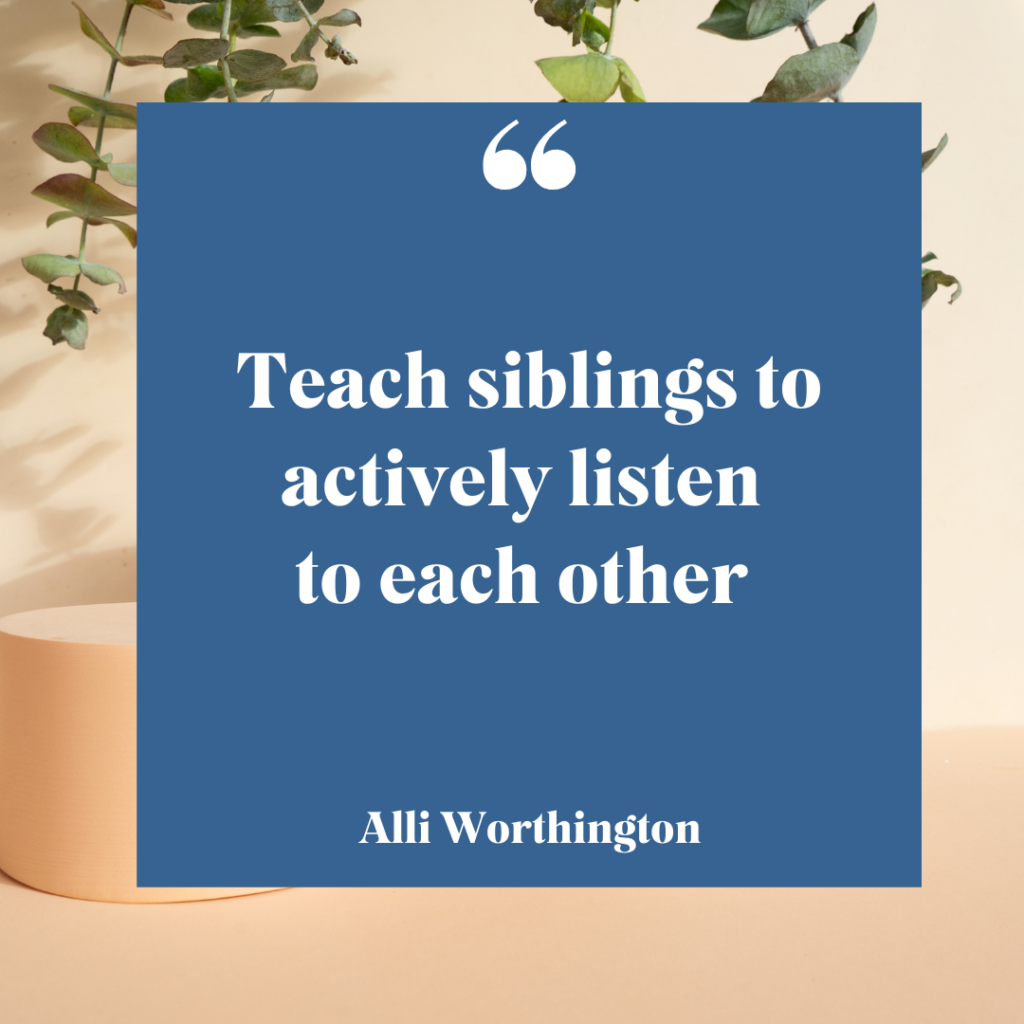You know building your brand is a crucial step to crafting your dream business. This workbook is designed with you in mind to simplify those steps.
Take the 3 day course building challenge
15 Amazing Ways to Encourage Sibling Bonds (Even When They’re Opposites)

Sibling relationships are some of the most important and influential relationships. Yet sometimes it can be difficult to foster healthy bonds between siblings.
We all have unique personalities and interests. As parents, it is important to strengthen sibling relationships despite differences. In this list, I have compiled 15 ways to encourage sibling bonds.
Whether it’s through spending time together, working on a common goal, or learning to communicate and resolve conflicts, these tips can help siblings build stronger and more meaningful relationships with each other. These healthy bonds will carry them well into adulthood.
1. Dedicate weekly sibling bonding time
Encouraging siblings to spend time together is crucial for building strong relationships. One of the most effective ways to do this is by setting aside dedicated sibling bonding time each week.
While you all live under the same roof, your kids are spending more time apart than they are together. Your weeks may be packed with sports and extracurricular activities, which can make connecting difficult for families. Dedicated sibling time allows them to develop shared interests and build trust and respect.
Whether you schedule a weekly outing or family game night, exploring new places and bonding over activities can create lasting memories and strengthen their bond. This provides a fun and (hopefully) relaxed environment with little bickering.

2. Foster a culture of mutual respect and communication
Fostering a family culture of respect and communication is essential for creating a harmonious environment. This shows siblings that family is a safe place to share thoughts and feelings.
As parents, we model this first. Speak kindly and calmly to your children, even during disagreements. Use “I” statements instead of “you” statements. Actively listen to what your children have to say.
Encourage them to speak openly and honestly, without fear of judgment or retaliation. That means, regardless of what comes out of their mouths, you have to keep your cool.
While open communication is important, it’s also key to establish boundaries and consequences for disrespectful or hurtful behavior. Make it clear that disrespectful behavior will not be tolerated, and there will be consequences for such actions.
Create space for your children to work together to find solutions to conflicts or disagreements. Teach them how to compromise and negotiate effectively.
3. Celebrate each other’s successes and accomplishments, no matter how big or small
Encourage siblings to recognize and celebrate each other’s successes no matter how big or small. This helps build a positive and supportive family dynamic. They boost each other’s self-esteem when they see their accomplishments are valued.
Celebrate each success as a family. For example, have a special family dinner or do something fun together. This reinforces the idea that successes are not individual achievements. They are moments to be celebrated as a family.
By honoring each other’s successes, they are creating a strong foundation for future support.

4. Encourage siblings to work together on a common goal or project
Inviting siblings to work together on a common goal or project promotes teamwork. Whether it’s planning a family outing, vacation, or event, collaborating promotes unity.
Assign roles and responsibilities so each sibling feels a sense of ownership and accountability. This promotes teamwork as each sibling handles their own task while contributing to the larger goal.
Encourage siblings to communicate openly, respectfully, and consistently. This helps prevent misunderstandings and promotes a sense of harmony within the team.
Set achievable goals that each sibling can work towards. This builds confidence and motivation as siblings can see progress towards the overall goal. Don’t forget to celebrate each milestone achieved along the way. This boosts morale and encourages siblings to continue working towards the finish line.

5. Don’t compare; celebrate each other’s differences
Comparing siblings to each other can be detrimental to their self-esteem. It can also create resentment between siblings. Instead, celebrate their individual strengths and weaknesses and avoid making comparisons.
Whether it’s academic achievements or sports performance, emphasize the importance of individuality. This helps them develop a sense of self-worth and appreciation for their own strengths and weaknesses. Applaud them for noticing and celebrating each other’s differences.
While it sounds counterintuitive, gently acknowledging each sibling’s weaknesses can strengthen their bond. This promotes support and guidance. It boosts their trust and confidence in each other when they overcome challenges together.

6. Encourage siblings to take turns choosing activities or outings
Allowing siblings to take turns choosing activities or outings promotes fairness and inclusivity. Put the necessary parameters in place so you’re not going to the same park or watching the same movie every day.
Create a schedule or a rotation system that outlines who chooses the activity or outing and when. Make it clear that everyone will have a chance to choose the activity and each person’s choice will be respected.
Mama, this is for you. Try to be enthusiastic and supportive of their choice, even if it’s the last thing you want to do. This will help create a positive and inclusive atmosphere.
7. Teach siblings to work through conflicts constructively and respectfully
Navigating sibling conflict may be one of the hardest feats of motherhood. But teaching them how to work through disagreements will be one of the most important skills they’ll take into adulthood. It’s also essential for building stronger relationships with each other.
Encourage siblings to communicate openly and honestly with each other about their feelings and needs. Make sure they feel safe to express themselves without fear of judgment or retaliation. Remember, watch your response!
Teach your siblings to actively listen to each other. That means repeating back what the other person said to ensure understanding and acknowledging their feelings.
Promote empathy. Help your siblings see the situation from each other’s perspective by encouraging them to put themselves in the other person’s shoes.
Recently, I had a fantastic conversation with Andy and Sandra Stanley. They’ve raised three children successfully! What did ‘success’ mean to Andy and Sandra? Success in parenting wasn’t about high academic scores or athletic achievements. Instead, success in parenting meant healthy sibling and parental relationships. Listen to their wise words here. You can purchase their new book Parenting: Getting It Right on Amazon.
8. Create a family mission statement
A family mission statement is a shared vision and set of values that guide the behavior and decisions of a family. Involve the whole family in the process of creating this statement.
This promotes collaboration and cooperation as well as a shared sense of purpose and direction. When siblings understand and internalize the family’s values and goals, they are more likely to feel a sense of connection and belonging to the family unit.
This can be a very memorable and powerful experience and tool for the whole family!
9. Establishing family traditions
Family traditions are a powerful way to foster healthy and special sibling bonds. Traditions provide a sense of continuity and connection between siblings. They create opportunities for shared experiences and memories that can last a lifetime.
Traditions give siblings a sense of belonging and identity. Whether it’s a yearly family vacation or a weekly game night, traditions create opportunities for siblings to come together and enjoy each other’s company. These shared experiences can create powerful and positive associations.
Traditions also reinforce family values and priorities. When siblings grow up prioritizing family time, connection, and togetherness, they are more likely to carry them forward into their own individual relationships and families.
Here is a monthly list of family traditions you can start now!
10. Encourage older siblings to help with younger siblings at bedtime
I’m not saying that you should leave the entire responsibility to the older sibling. Do that, and no one is going to bed! But when an older sibling helps with bedtime, they develop a sense of responsibility and pride in their ability to care for their younger sibling. This fosters a positive dynamic of care and support between siblings.
Bedtime routines can be a special time. Whether it’s through reading stories, singing songs, or simply talking and sharing their thoughts and feelings, these shared moments can create lasting memories and positive associations.
When an older sibling helps their younger sibling to bed, it can prove their commitment to their sibling’s well-being. It creates a sense of trust and respect.
As a parent, you would never send your kid to bed without a hug and an “I love you.” So at the minimum, include in your bedtime routine a chance for your children to always say “Goodnight” and “I love you” to each other. This can help promote a positive sibling relationship built on support, care, and mutual respect.

11. Space and time apart can be valuable
Providing opportunities for siblings to spend time apart can actually help strengthen their bond.
Nobody knows this better than a mom. As much as we love our kids, a little bit of space does everyone good! The same goes for siblings.
Time apart can reduce conflicts and tension between siblings. What mom doesn’t want that?
When siblings spend too much time together without breaks, they may start to feel irritated or frustrated with each other. Taking some time apart can help to reset and recharge, reducing tension and promoting a more positive dynamic when they come back together.
Time apart can promote independence and individuality. When siblings have opportunities to pursue their own interests and hobbies, they can develop their own unique identities and skills.
12. Teach children about boundaries
When siblings learn how to set and respect boundaries, they develop a deeper sense of respect, trust, and understanding. Learning how to set and honor boundaries will benefit them in relationships in and outside of the home. They can develop a sense of autonomy and agency.
When siblings have clear boundaries and understand each other’s limits and needs, they are less likely to engage in behavior that could lead to conflicts or hurt feelings.
13. Boost bonding with oxytocin
Oxytocin is a hormone that is known as the “feel good” hormone. It is released during positive social interactions. Activities such as dancing, tickling, cuddling, holding hands, and even roughhousing can increase levels of oxytocin.
Laughter is a powerful tool for releasing oxytocin and promoting social bonding. Siblings who share a sense of humor and engage in playful activities together are likely to experience an increase in feelings of closeness and joy.
Name one sound that is sweeter than your kids laughing together. I’ll wait.
14. Start a kindness journal
Together, pick out or make a journal where you can begin to log acts of kindness. Creating a routine allows siblings to recognize and appreciate the good deeds on a regular basis. Often, in the hustle and bustle of daily life, we can overlook the small acts of kindness that our siblings perform for us. By keeping a journal of these acts, we are reminded of the ways in which our siblings are looking out for us and supporting us.
By taking the time to write these down, we are demonstrating our gratitude and appreciation for them. This can, in turn, encourage our siblings to continue being kind to us and to each other as they see that their actions are valued and appreciated.
This can be especially valuable for siblings who may have experienced conflict or tension. It provides a tangible record of the positive steps they have taken to build a stronger bond.
This kindness journal is a great place to start.
15. Let’s talk about faith
Instilling a strong faith can bond your kids for life. Faith builds values and principles that siblings can practice together. This includes all of the fruits of the spirit: love, joy, peace, patience, kindness, goodness, gratefulness, gentleness, and self-control.
Mama’s this too starts with us. Only a faithful mama can raise faithful kids. God commands this of us.
“Love the Lord your God with all your heart, with all your soul, and with all your strength. These words that I am giving you today are to be in your heart. Repeat them to your children. Talk about them when you sit in your house and when you walk along the road, when you lie down and when you get up.” – Deuteronomy 6:5-7
When siblings share a faith, they have a shared sense of purpose and meaning to life. They are a built-in support system for each other, providing comfort and strength during difficult times. They can pray together, share their struggles, and encourage each other to persevere.
Instilling faith can be an effective way to increase sibling bonds as it provides a shared belief system and a common ground for siblings to connect with each other.
Shared experiences such as faith adventures, camps, volunteering, and weekend services can create lasting memories and build Christlike character.
Take a listen to my podcast with David Kinnamen How to Build Resilient Faith in your Children with David Kinnaman Episode 254
Your Action Step
And mama, don’t think I forgot about you! You can’t ‘mom’ from an empty cup. Take my quiz and find your Mom Superpower. Discover your unique strengths and gifts that will help you enjoy and celebrate who you are as a mom.
Our biggest role as parents is nurturing a healthy relationship with our kids and promoting a healthy relationship among siblings. Through the bickering, biting, and sometimes not-so-brotherly love, it can be hard to navigate in the moment.
Remember, the sibling relationship is essential, and they will have (and need) each other long after we’re gone. Putting in the hard work when they’re young will reap much fruit down the road. Raising kids who are also friends is one of the most rewarding feats of motherhood!
Take my quiz and find your Mom Superpower.
